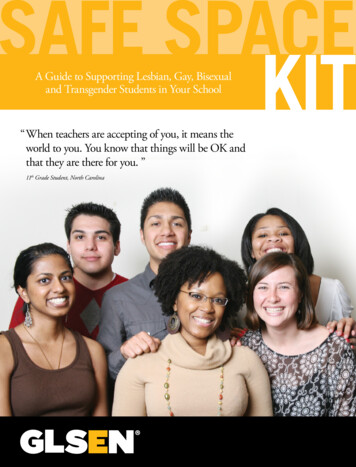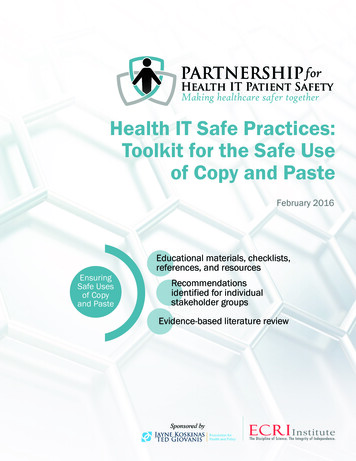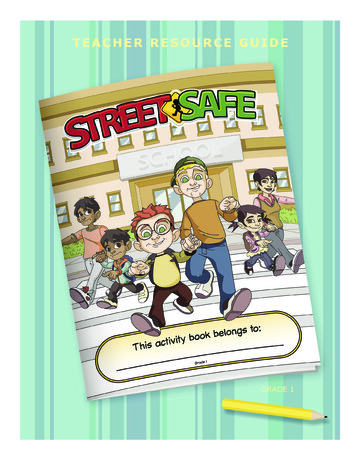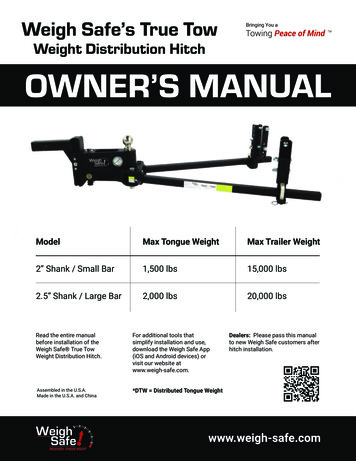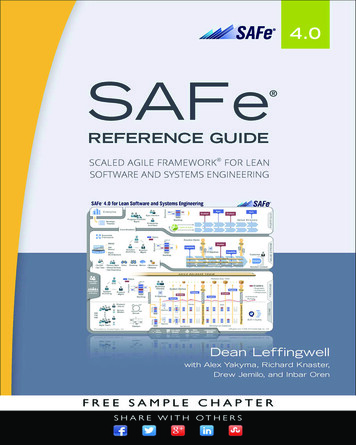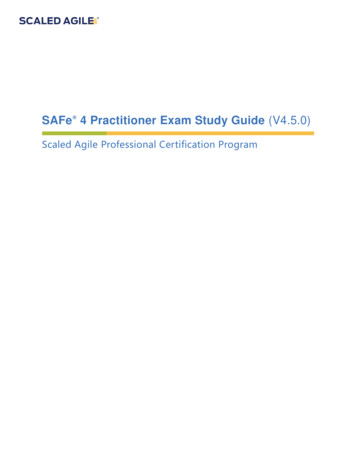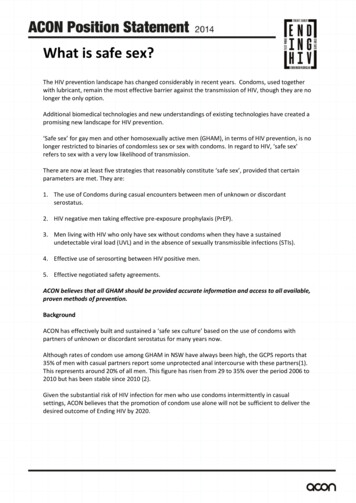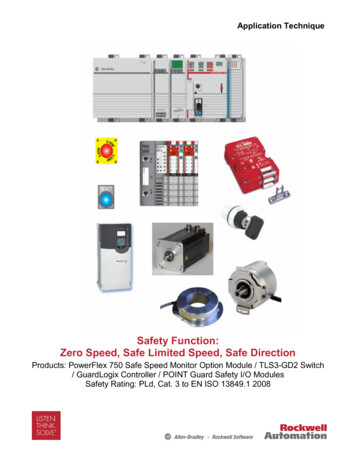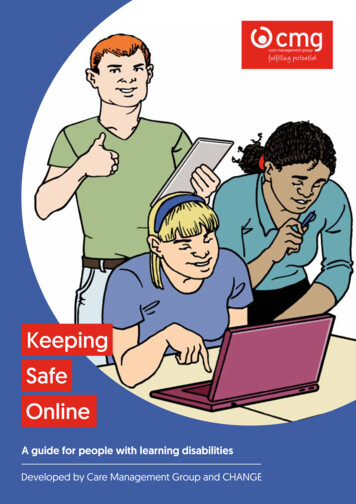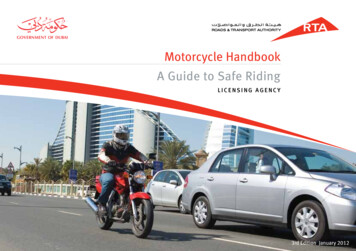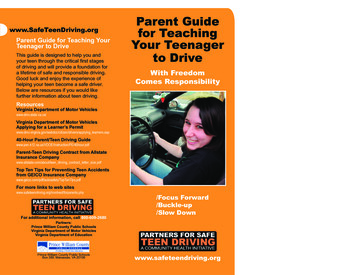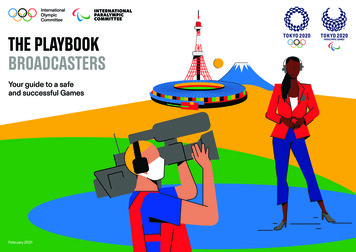
Transcription
Your guide to a safeand successful GamesFebruary 2021
2Senior Management Personnel of RHBs(RTa)Production and Technical Personnel of RHBs(RTb)IBC Support Personnel of RHBs(RTc)Hospitality Programme Project Lead(RTh)Hospitality staff(RTh)Senior Management Personnel of Host Broadcaster(HBa)Production and Technical Personnel of Host Broadcaster(HBb)IBC Support Personnel of Host Broadcaster(HBc)
3CONTENTSWho is this Playbook for?Stronger TogetherPrinciples245-8Your JourneyIntroductionBefore you TravelEntering JapanAt the GamesLeaving Japan1012-1617-2021-2930-32Further InformationVaccinesCompliance and Sanctions3435
4STRONGERTOGETHERAfter the longer-than-anticipated wait for the Olympicand Paralympic Games Tokyo 2020, they are now onlya few months away. We have all faced challenges in ourpreparations – challenges that we are working throughtogether as we develop plans for a safe and successfulevent this summer. We look forward to the moment whenthe power of sport and of the Games will unite everyone,and athletes will inspire the world once again. Strongerthan ever, stronger together.To get there, we each have our part to play. The health andsafety of everyone at the Games is our top priority. Thatis why this Playbook has been created – to outline therules that will allow each and every one of us to contributeto safe and successful Games. It has been developed toensure it best supports your role and needs.If you have been to the Games before, we know thisexperience will be different in a number of ways. Forall Games participants, there will be some conditionsand constraints that will require your flexibility andunderstanding.No doubt you will have questions. This first version of thePlaybook aims to provide the main principles that will guideus all as we continue to build more detailed plans – and thecontext that we will face becomes clearer. An update willbe published by April and may change as we get closer tothe Games. We will make sure you have all the informationyou need, as quickly as possible.We are #StrongerTogether. The values we share –Excellence, Friendship and Respect – will lead us to asafe and successful Games. We firmly believe that if everysingle one of us commits to following the Playbook, we willcome together in the summer for an extraordinary Gamesthat will stand out in memory for all the right reasons.Thank you and see you at the Games.Yiannis Exarchos,CEO Olympic Broadcasting Services
5PRINCiPLES
Principles6COVID-19 is transmitted through infected droplets in our breath exhaled by coughing,sneezing, talking, shouting or singing – and is passed from person to person when weare in close contact. The risks of catching COVID-19 grow in crowded poorly-airedspaces and when we spend time in proximity to those carrying COVID-19. That is whyit is important to minimise social interaction, wear a mask, and avoid the 3Cs: spacesthat are closed, crowded or involve close contact.#1#2Keep physicalinteractions withothers to a minimum#4#3Avoid physical contact,including hugs andhandshakes#5Avoid enclosedspaces and crowdswhere possibleKeep two metres, distancefrom athletes and at leastone metre from others,including in operationalspaces#6Use Games transportsystems according to yourown specific Playbook.Do not use publictransport unless givenpermissionComplete and followwhat you describe inyour activity plan
Principles7To stop the spread of COVID-19, it is vital to break the chain of human-to-humantransmission. That is why it is important to identify who has the COVID-19 virus,through testing; understand who the disease might have been passed to, throughcontact tracing; and to use isolation and quarantining to stop the virus fromspreading further.#1#2Download Japan’s COCOAand health reportingsmartphone applications(apps)#4#3Get tested and provideproof of a negativeresult before youdepart for the Games.You may be tested againwhen you arrive (dependingon where you arrive from)#5If required for your role,have regular screeningtests for COVID-19 duringthe GamesGet a test and isolateif you experience anysymptoms or are told toby tracing servicesFollow the additionalrestrictions that apply toyour first 14 days in Japan,detailed in your ownspecific Playbook
Principles8COVID-19 can live on everyday surfaces through droplets exhaled by an infected person.If we touch those objects with our hands and then touch our eyes, nose or mouth we runthe risk of becoming infected. That is why we must not forget the basics of good hygiene— regularly and thoroughly cleaning our hands, disinfecting surfaces, avoiding touchingour face, and covering our mouths when we sneeze or cough.#1#2Wash your hands regularlyand use hand sanitiserswhere available#4#3Wear a face mask at alltimes, unless outsideand two metres awayfrom others#5Support athletes byclapping and not singingor chantingCough into your mask,sleeve or tissue#6Avoid using shareditems where possible,or disinfect themVentilate rooms andcommon spaces every30 minutes
9YOUR JOURNEY
Introduction10IntroductionThe Playbooks are the basis of our game plan to ensureOlympic and Paralympic Games participants and thepeople of Japan stay safe and healthy this summer.They have been developed jointly by Tokyo 2020,the International Olympic Committee (IOC) and theInternational Paralympic Committee (IPC). They are basedon the extensive work of the All Partners Task Force, whichalso includes the World Health Organization, Governmentof Japan, Tokyo Metropolitan Government, independentexperts and organisations from across the world.This Playbook sets out the responsibilities of RightsHolding Broadcasters (RHBs) and should be consideredalongside wider information received from yourResponsible Organisation and Tokyo 2020. The rules applyin the same way to every RHB, regardless of your positionor where you are living – just as they also apply to all otherGames participants.Please take time to understand the plans, the steps youmust take and the rules you must follow – starting 14 daysbefore you travel and throughout the length of your stay inJapan. As an accredited RHB, you will play an active andintegral role in the story of these Games. Your actions willmatter as much as the athletes to our collective success.If you are already living in Japan, please consider how thisinformation applies to you as you prepare for the Games.This could mean that future versions of the Playbook couldinclude more restrictions than those currently listed.Important informationThis Playbook will be updated regularly as required toensure it reflects the latest developments. The next versionwill be published by April 2021.Every RHB participating in the Games will be required toappoint a Covid-19 Liaison Officer This person will be yourkey contact for all matters related to Covid-19. They willalso be the contact for the IOC, IPC, Tokyo 2020, OBS andthe Japanese health authorities. Your COVID-19 LiaisonOfficer will be responsible for ensuring you understand andfollow this Playbook. They will receive their own detailedguidelines related to their role.Please note:This Playbook is written under the current understandingof the IOC, IPC and Tokyo 2020. Further changes mayneed to be made to certain countermeasures in the future,in collaboration with the Government of Japan and TMG,to ensure the evolutions of conditions and regulations inJapan can be fully taken into account.We trust that the measures laid out will mitigate any risksand impacts involved in participating in the Games, and wefully count on your support to comply with them. However,despite all care taken, risks and impacts may not be fullyeliminated, and therefore you agree to attend the Olympicand Paralympic Games at your own risk.
Before You TravelYour journey does not begin at the airport. Starting fromnow, ensure you take time to read and understand eachlatest version of the Playbook thoroughly when youreceive it. If you have any questions, contact yourResponsible Organisation or COVID-19 Liaison Officer*(once appointed) in good time before the Games.Rules in this Playbook apply from 14 days beforeyour travel. It’s important to adopt the right mindsetin this period.*More guidance on the COVID-19 Liaison Officer role willbe available when confirmed, no later than the April 2021update of this PlaybookRead this Playbook thoroughlyBefore you travel, confirm that you have read andunderstand the Playbook, and that you agree to therules. See ‘Compliance and sanctions,’ page 35You will be required to have medical treatment andrepatriation insurance covering the entire period ofyour stay in Japan12
Before You Travel Make sure you have a Pre-Valid Card (PVC) (whichwill be validated into your Olympic Identity andAccreditation Card (OIAC)/Paralympic Identity andAccreditation Card (PIAC). Otherwise, you may needa visa to enter Japan Complete an activity plan* for the first 14 days of yourstay in Japan, which you will need to share with theJapanese authorities. It should include:– All your planned activities– Where you will travel – restricted to Official GamesVenues (as per your accreditation privileges), youraccommodation and limited additional locations asdefined by the ‘List of Destinations and Movement’.See ‘At the Games,' page 21– How you will travel– Where you will stay*More details on the activity plan (includingtemplate) will be provided when confirmed, no laterthan the April 2021 update of this Playbook Make sure you know the latest information onCOVID-19 testing and certificates needed by yourairline, for any transit countries and for entry intoJapan. See Japanese government advice Download, install and register on the ContactConfirming App (COCOA) and health reportingsmartphone applications (apps). See ‘SupplementaryAnnex - Smartphone Applications’ Monitor your health daily for the 14 days before youtravel to Japan– Take and record your temperature daily– Proactively monitor your personal health everyday (for example, body temperature and any otherCOVID-19 symptoms). Report the results on thehealth reporting app. This information will be sharedwith the Japanese health authorities, Tokyo 2020and your COVID-19 Liaison Officer, in accordancewith relevant laws and regulations regardingpersonal information protection (details to beconfirmed)13
Before You Travel If you experience any symptoms of COVID-19 in the14 days before departure:– Do not travel to Japan– Inform your COVID-19 Liaison Officer, who willexplain the next steps. See WHO guidelines onCOVID-19 symptoms Take a test approved by the Government of Japanwithin 72 hours of the departure time of your flight toJapan (first flight if you are on an indirect route)– Currently, approved test types (saliva or nose and/or throat swab) are real-time PCR, nucleic acidamplification (LAMP) and antigen (CLEIA) tests– Measures are also being considered to ensure theauthenticity of certificates If your COVID-19 test is negative:– Obtain a certificate of your negative COVID-19 test– Be ready to present your negative test result to theJapanese immigration authorities when you arrivein Japan– You may be asked to submit your negative test resultvia the health reporting app If your COVID-19 test is positive:– Immediately begin self-isolation in line withlocal rules– Inform your COVID-19 Liaison Officer, who willrecord your symptoms, test results, check-ups andclose contacts, as well as inform the organisers andagree on next steps14
Before You Travel Keep your physical contact with other people to aminimum during the 14 days before you travel to Japan Prepare a list of all the people you expect to haveclose contact* with during your time in Japan, forexample, your roommate or immediate members ofyour team– The list will be submitted to and validated by yourCOVID-19 Liaison Officer, who will use it to helpwith contact tracing if needed*More guidance on close contacts will be availablewhen confirmed,no later than the April 2021 updateof this Playbook15
Before You Travelhygiene Follow good hygiene practice – including wearinga face mask, washing your hands regularly or usinghand sanitiser Make sure you have access to enough face masksto last throughout your stay in Japan. Everyone isresponsible for their own supply– Follow WHO recommendations on mask wearing– If using fabric masks, ensure that they can bewashed in high temperatures regularly, with atleast two but ideally three layers:– Inner layer of absorbent material, such as cotton– Middle layer of non-woven material, such aspolypropylene– Outer layer of non-absorbent material, such aspolyester or polyester blend Check the manufacturer’s recommendations andhealth certification of the product Note:– You will need to replace your masks as soonas they become damp and wash them once a day.You may use more masks than usual in hot andhumid weather– Please also be aware of guidelines related to facemask brandingSee WHO guidance on wearing a mask16
17When you arrive, you must observe the following protocolsat the airport and for your onward journey.Physical distancing and good hygiene measures must befollowed throughout your time in Japan. Additional rulesalso apply for the first 14 days of your visit.Have your Pre-Valid Card (PVC) ready to validate intoan Olympic Identity and Accreditation Card (OIAC) orParalympic Identity and Accreditation Card (PIAC),which will be required to enter Japan.
Entering Japan Be ready to show immigration authorities:– Your PVC, OIAC/PIAC or visa, along with yourpassport or other travel certificate associated withyour PVC/visa– Evidence of your negative COVID-19 test takenwithin 72 hours of your departure Be ready to take a COVID-19 test at the airport,depending on the country you travelled from andwhere you’ve been in the last 14 days– If your test result is confirmed positive you mustisolate* in accordance with the instructions of theJapanese health authorities, which may be in agovernment-approved isolation facility*More guidance on isolation will be available whenconfirmed, no later than the April 2021 update ofthis Playbook18
Entering Japan Move as quickly as possible through the airport.Do not stop to visit any shops or other services, otherthan the Accreditation Validation Counter (if you holda PVC) Do not use public transport, unless given permission19
Entering Japan If you use a wheelchair or other mobility devicethat may be handled by another person undercertain circumstances (for example airline staffduring travel), regularly disinfect the relevantsurfaces with sanitising wipes20
21During your stay in Japan, you will be expected to limit youractivities to what is required in order to carry out your role.Physical distancing and good hygiene measures mustbe followed throughout your time in Japan, to help keepeveryone safe and healthy. Additional rules also apply forthe first 14 days of your stay.You are responsible for proactively monitoring andreporting your personal health every day via the healthreporting app.Testing will be a crucial part of minimising transmission:used for general screening (depending on your role) andfor those identified as a close contact of a positive case;as well as used for diagnosis for those experiencingsymptoms of COVID-19.All RHBs will be permitted to conduct interviews andfilm with athletes at the Venue Mixed Zones and at theOlympic/Paralympic Village Plaza Mixed Zone. Wherededicated transport is available, interviews may also takeplace at the IBC and RHB TV studios. These locationsmust have temperature checks conducted on entryincluding the Olympic Village Plaza Mixed Zone and beable to guarantee physical distancing of athletes alongwith the highest standards of sanitation and personalprotection equipment*.Please note that capacities in venue broadcast facilitieswill be adjusted in order to comply with the adoptedphysical distancing measures. These facilities includeMixed Zones, Dedicated Camera Platforms, AnnouncePositions/Occasional Presentation Positions (OPPs),Commentary Positions, Observer Seats and BroadcastCompounds, as well as at the Olympic/Paralympic VillagePlaza Mixed Zone and the TV Studios.All ENG Mixed Zone positions, ENG platforms andObserver Seats will require booking through OBS.*OBS and Tokyo 2020 will develop further operationaldetails which will be available no later than April 2021.
At The Games Proactively monitor your personal health every day (forexample, body temperature and any other COVID-19symptoms). Report the results on the health reportingapp. See ‘Supplementary Annex – SmartphoneApplications' You will be tested for COVID-19 regularly duringyour stay at the Games, depending on the natureof your role If you have a confirmed positive test for COVID-19during the Games:– Immediately begin isolating* and inform yourCOVID-19 Liaison Officer– You will either be required to continue isolatingor be hospitalised– The location (which may be in a governmentapproved isolation facility) and length of yourisolation period will be determined by the Japanesehealth authorities, depending on the severity andsymptoms of your infection– You will be discharged from isolation in accordancewith the discharge guidelines in Japan Your COVID-19 Liaison Officer will review youractivities including those you have had close contactwith and Games venues visited from two days priorto your first symptom or the time of test to when youstart isolating– They will work with the Japanese health authoritiesand Tokyo 2020 to determine further measures suchas sanitisation of certain spaces Your close contacts will be informed and will need tofollow further instructions by local health authority andTokyo 2020 organisers*More guidance on isolation and testing (timing,frequencies and locations) will be available whenconfirmed, no later than the April 2021 update ofthis Playbook22
At The Games If you are a close contact of someone who testspositive for COVID-19 during the Games– You will be informed via COCOA and/or called fortesting by your COVID-19 Liaison Officer– Immediately stop your coverage activities and leavethe competition venue or IBC– Your COVID-19 Liaison Officer will contact youregarding the next steps– Go for testing immediately after receiving thenotificationBe ready to have your temperature checked everytime you enter a Games venue*– If you record a temperature of 37.5 degrees Celsiusor higher, a second check will be carried out forconfirmation– If you again record a temperature of 37.5 degreesCelsius or higher, you will not be permitted to enterthe venue. You must notify your COVID-19 LiaisonOfficer and follow their instructions. You will be takento an isolation area to wait for further measures*More details on temperature checks at venues willbe available when confirmed, no later than the April2021 update of this Playbook If you experience any symptoms of COVID-19 duringyour stay, immediately contact your COVID-19 LiaisonOfficer, who will explain the next steps. See WHOguidance on symptoms23
At The Games Keep your close contact list up to date Keep a minimum of two metres’ distance fromathletes at all times Keep a minimum of one metre’s distance from others.See ‘Operational Principles,' page 25 Avoid enclosed spaces and crowds wherever possible– Avoid staying an unnecessarily long time in a spacewhere physical distance cannot be maintained.Refrain from talking in crowded areas such aselevators Avoid unnecessary forms of physical contact such ashugs and handshakes Additional rules apply to your first 14 days in Japan:– You must only leave your accommodation to goto Official Games Venues and limited additionallocations, as defined by the ‘List of Destinations andMovement’*– You must not visit Games venues as a spectator– You must not visit tourist areas, shops, restaurants orbars, gyms, etc. Do not use public transport, unless given permission*The List of Destinations and Movement will beavailable when confirmed, no later than the April 2021update of this Playbook24
At The Games Commentary Positions/Observer Seats*See Supplementary Annex – 'Broadcast FacilityPrinciples,' page 3– At least a one-metre distance will be maintainedwithout enlarging the overall footprint– In order to maintain a one-metre distance, twopeople will be allowed in each three-seater position(EP03/UP03). One person to be allowed in eachtwo-seater position (EP02/UP02) and one person ina one-seater position (EP01)– Clear acrylic partition to be installed where physicaldistancing is not possible– Observer Seats to follow physical distancingmeasures for Spectator SeatsMixed Zones* See Supplementary Annex – 'BroadcastFacility Principles, pages 4-5– At all venues, a maximum crew of two people willbe allowed at all dedicated TV positions (MZ01).In Radio positions (MZ02), only one person willbe allowed– The use of a boom microphone will be mandatoryin order to ensure the two-metre distance betweenathletes and interviewers is maintained– The floor of the Mixed Zone will be marked at allvenues to ensure physical distancing: Athleteposition two metres RHB position– The number of people accessing the Broadcast sideof the Mixed Zone will be strictly controlled Dedicated Camera Positions. No changes todedicated camera positions (CP01, CP02, CP03) Announce Positions/OPP* See Supplementary Annex– 'Broadcast Facility Principles,' page 6– Maximum capacity of each platform hasbeen determined based on the dimensionsof each structure– RHBs are responsible for ensuring they have nomore than the maximum number of people allowedin their allotted space*Further operational procedures will be publishedwhen confirmed, no later than the April 2021 updateof this Playbook25
At The Games ENG MZ and ENG platforms– Across all venues, ENG positions will becomebookable per session to ensure a distance of atleast one metre between RHBs Venue flows for all constituents will be publishedwhen confirmed, no later than the April 2021 updateof this Playbook, based on Tokyo 2020 adoptedcountermeasures TM Load Zone and VSA/PSA Operations will bepublished when confirmed, no later than the April 2021update of this Playbook, based on Tokyo 2020 adoptedcountermeasures IBC* See Supplementary Annex ‘Broadcast FacilityPrinciples,' page 7– RHBs will have to ensure at least one-metredistancing from others within their privatebroadcast areas and the IBC, and two-metredistancing from athletes– If unable to keep the one-metre distance in certainoperational areas, clear acrylic partitions should beinstalled by the Broadcaster– Athlete-dedicated drop off points will be establishedin the underground parking, or overground near theC compartments. Dedicated paths for athlete uselinking the drop off points and the areas of eachRHB will also be established. Broadcasters will beresponsible for escorting athletes along these pathsto their areas and back– Broadcasters will clean and disinfect sharedsurfaces and items (for example, consoles,microphones, headsets, etc.) inside their privateareas before and after each use, with specialattention to interview areas– Issuance of IBC guest passes will be limited strictlyto essential operational needs only*Further operational procedures will be publishedwhen confirmed, no later than the April 2021 updateof this Playbook26
At The Games Olympic/Paralympic Village Plaza Mixed Zone*See Supplementary Annex ‘Broadcast FacilityPrinciples,' page 9– Access will be limited TV towers and RHB TV studios* See SupplementaryAnnex ‘Broadcast Facility Principles,' page 8– Maximum capacity of each studio will bedetermined based on the dimensions of eachstructure and taking into account two-metres'physical distancing between broadcasters andathletes and one metre amongst crews– Temperature checks will be conducted on entry bythe RHB organisations. Other sanitation protocolswill also need to be followed– Dedicated pathways for athletes respecting twometres' distancing will be created and observed atall times– VSA check of athletes without exiting the vehicleto be confirmed Transport of athletes – Olympic and ParalympicVillage to IBC and RHB TV Studios:– Athletes will have to be able to be transportedfrom the Olympic/Paralympic Village to thededicated drop off points by dedicated RHBand NOC/NPC vehicles*Further operational procedures will be publishedwhen confirmed, no later than the April 2021 updateof this Playbook27
At The Gameshygiene Practice good hygiene throughout your stay inJapan. Respect the rules displayed in venues, diningareas and accommodation facilities, where enhancedcleaning protocols and hygiene countermeasures willbe in placeWear a face mask at all times, except when eatingand sleeping, or if you are outside and able to keeptwo metres apart from others. See WHO guidance onwearing a mask– Sanitise your hands before putting on your maskand avoid touching your eyes, nose and mouth. Ifpossible, wash your hands with soap and warmwater for at least 30 seconds. Otherwise use handsanitiser– Replace masks as soon as they become damp andwash them daily– A face shield is not an acceptable alternative to amask. They should only be used to prevent infectionof the eye area or in situations where wearing a maskwould be impractical Always cough into your mask, sleeve or tissue.Throw away used tissues/disposable masks/maskfilters in a bin Wash your hands regularly and thoroughly for atleast 30 seconds, ideally using soap and warm water.Otherwise use hand sanitiser Ventilate rooms regularly – at least every 30 minutes,and for a period of several minutes each time Avoid sharing items wherever possible. Alwaysdisinfect items that have been used previously bysomeone else If you are with OBS or an RHB, your organisationmust take responsibility for cleaning measures that falloutside defined Tokyo 2020 service levels Broadcasters are responsible for providing all yourown sanitisation materials, for example disinfectant,sanitising wipes, etc.28
At The Games If you use a wheelchair or other mobility device thatmay be handled by another person under certaincircumstances (for example drivers), please makesure to regularly disinfect the relevant surfaces withsanitising wipes The restriction of keeping at least one metre’s distancefrom others will be waived for individuals in need ofadditional support, who can receive assistance fromanother member of their immediate circle– Masks should be worn at all times when providingassistance to others– Once aid has been given, sanitise your hands and goback to maintaining a physical distance of at leastone metre from others– You should still try to keep physical contact to aminimum when possible You may temporarily remove your mask if you arespeaking or providing assistance to someone whorelies on lip reading, clear sound and/or facialexpressions to communicate. You should stay at adistance of minimum two metres and should put yourmask back in place as soon as possible29
30You should continue to follow the Playbook – includinghygiene and distancing rules – throughout your departureand until you reach your destination.
Leaving Japan Make sure you know the latest entry requirementsfor your destination country, as well as any countriesyou will pass through in transit Be ready to take a final COVID-19 test* beforedeparture, which may be needed for internationaltravel When you arrive at your destination, follow localCOVID-19 regulations*More detailed information on pre-departure testingwill be provided when confirmed, no later than theApril 2021 update of this Playbook31
Leaving Japan If you intend to stay in Japan to attend the ParalympicGames, more guidance will be provided whenconfirmed, no later than the April 2021 update ofthis Playbook32
33
Further InformationVaccines are one of many tools available in the toolbox,to be used at the appropriate time and in the appropriateway. The IOC continues to strongly support the priority ofvaccinating vulnerable groups, nurses, medical doctorsand everyone who is keeping our societies safe.When vaccinations are made available to a broader public,the IOC calls for Olympic and Paralympic teams to bevaccinated – given their role as ambassadors of their NOCsand NPCs given the role of sport “to promote safe sport asa contributor to the health and wellbeing of individuals andcommunities”, as recently stated in a UN resolution, whichwas adopted by consensus in the UN General Assembly.This resolution also highlighted the importance of theOlympic and Paralympic Games.Therefore, the IOC will work with the NOCs to encourageand assist their athletes, officials and stakeholders to getvaccinated in their home countries, in line with nationalimmunisation guidelines, before they go to Japan. This isto contribute to the safe environment of the Games, butalso out of respect for the Japanese people, who should beconfident that everything is being done to protect not onlythe participants, but also the Japanese people themselves.During consultation calls with the NOCs, the IOC wasinformed that a number of national governments havealready taken positive decisions in this respect or are inconsultation with their NOCs.In order to get a full picture about the vaccination situationfor the 206 NOCs, the IOC has sent a letter to the NOCsasking them to actively engage with their respectivegovernments on this matter and to report back to the IOCin early February 2021. The NOCs are encouraged to do soin association with their respective NPCs.Please note:You will not be required to have received a vaccine in orderto participate in the Games – and all of the rules outlined inthis Playbook will apply, whether or not you have receivedthe vaccine.34
Further InformationDespite all care taken, we draw to your attention that risksand impacts may not be fully eliminated and that you agreeto attend the Olympic and Paralympic Games at your ownrisk. We trust that these measures are proportionate tomitigate the
a visa to enter Japan Complete an activity plan* for the first 14 days of your stay in Japan, which you will need to share with the Japanese authorities. It should include: – All your planned activities – Where you will travel – restricted to Official
